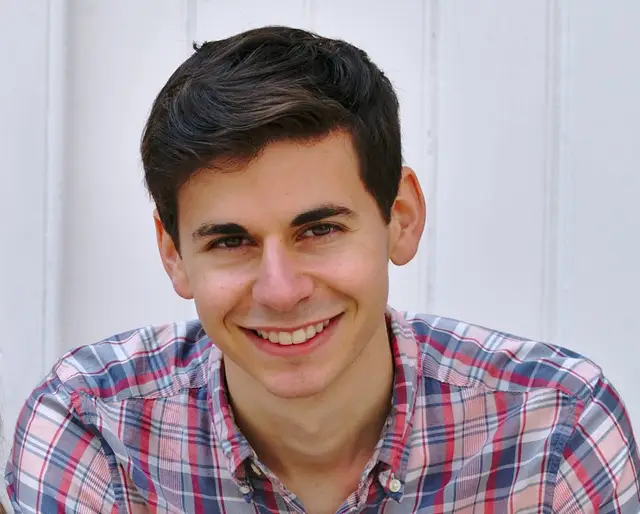Polygence Alums Share What They Learned from the Regeneron Talent Search
6 minute read
SCHOLARS IN THIS ARTICLE:
Maya Srinivasan - Accepted at Duke University, Regeneron STS Top 300 Scholar 24
Amish Sao - Accepted at Georgia Tech, ISEF '23 Grand & Special Award Recipient
“Regeneron helped me explore myself and identify what areas I would like to explore in the future, as well as my individual strengths in terms of problem solving, analysis, and writing.” -Maya, Polygence ‘23 / Regeneron STS Scholar ‘24
The Regeneron Science Talent Search (STS) and Regeneron International Science & Engineering Fair (ISEF) are two programs with one shared goal: to encourage and showcase the work of young researchers in STEM fields. Society for Science organizes the two competitions on an annual basis, alongside their current sponsor, Regeneron Pharmaceuticals. The programs are each more than 70 years old and offer more than $10 million in combined prizes. The STS is open to high school seniors in the United States, while ISEF is an international science fair for students around the world.
Students who prepare for a Regeneron competition alongside Polygence receive valuable support to help them excel in the competitions. At Polygence, we empower students through individual mentorship and by connecting them with tools and resources to get the most out of their Regeneron experiences personally and academically.
Do your own research through Polygence!
Polygence pairs you with an expert mentor in your area of passion. Together, you work to create a high quality research project that is uniquely your own.
The Journey to Regeneron – Starting with Polygence
Discovering academic passion is the first step for any Polygence project. What are the subjects and, most importantly, the questions that spark your curiosity? Is there a topic that you have always wanted to dig deeper into, but that hasn’t been explored in depth in school? Do you want to study how something works, or how to design your own solution to a problem that you see in the world? Polygence students get to brainstorm with dedicated, one-on-one mentors about research problems, projects, and opportunities within specific STEM fields and subfields.
After choosing a subject that fascinates you, the next stage is to work alongside your mentor to identify and refine your research question. For example, if you want to design a solution to an engineering problem, which component or components of that problem are the most urgent to address? Your Polygence mentor can help you dissect your chosen topic while giving you confidence that your hard work is going in the right direction. Are you wondering if your idea is too narrow or too broad? Are you trying to decide how much will be feasible to accomplish within your time constraints? Receiving expert guidance at this early stage is absolutely essential to ensuring that your final project will be feasible, beneficial to STEM research, and competitive at the national or international level of Regeneron STS or ISEF.
Developing a Winning Project – Insights from Polygence Students
Polygence mentors provide students with personalized feedback throughout the duration of their project, including crucial guidance during the early stages when initial research questions are just beginning to take shape. One Polygence student, Sameen, recently completed a project on wearable biomedical devices. She writes about her mentor, “In the beginning, my mentor was incredibly helpful in brainstorming project ideas and narrowing down my list by considering practical logistics. He raised important questions that guided my learning.” Shrihan, a Polygence student working on electric vehicles, received important guidance when honing in on his research topic. He writes, “Initially, I had a broad foundation on where to start, but my mentor helped me through the processes I could take to test my hypothesis.” After working with your mentor to identify a relevant and impactful research project, you’ll receive continued support as you plan and implement your experiments—even when you hit a roadblock.
It is common to encounter obstacles at least once during the research process; having a dedicated mentor on your team makes it easier to push through those difficult moments. For Sameen, that meant tackling stubborn challenges on the backend of her software with the help of an expert problem solver (Cameron, her mentor, is a PhD in Mechanical Engineering). “When I faced programming issues with my electronics,” Sameen said, “I was able to screen share my code and my mentor was able to look over it and explain the finer details of what was happening. He was fully invested in the project as much as I was, and put as much effort into supporting my journey throughout.” For Shrihan, working with his mentor (a PhD candidate at the University of Pennsylvania) helped him to design better experiments. In his own words, “As gearboxes and electric motors can be confusing topics to understand, I was able to gain important knowledge that played significant roles in my research and experimental data. [Bibit] taught me how to conduct experiments by plotting data from programming, showcasing useful graphs that can be used to evaluate the effects of gearboxes in electric vehicles.” Your Polygence mentor, armed with expert knowledge in your specific field of STEM research, will accompany you and your project from start to finish, through all of the ups and downs.
Polygence doesn’t end when the experiments are over; we also provide support and guidance to help you present and showcase your results to the judges of the Regeneron STS or ISEF competitions, empowering you to take your passion for research to the next level and beyond. Whether you’re a high school student aiming to become a young scientist the innovative thinking, mentorship, and project recommendations you receive at Polygence can significantly enhance your college application and overall STEM education.
The Competition Experience – from Polygence to Regeneron and Beyond
Student Experience: Isabel
After completing her Psychology research project with Polygence, Isabel wrote up and submitted her work to Regeneron and was named a 2022 Regeneron STS Top 300 Scholar. In the initial stages of her project, getting matched and connecting with her mentor helped Isabel feel more confident conducting original research that would be competitive at Regeneron STS. “Before joining Polygence,” she writes, “I felt overwhelmed by the task of conducting independent research. But with Nat’s guidance, I quickly narrowed down my project idea, wrote a research plan, and began conducting my study.” After helping Isabel get started down the right path, Nat accompanied her throughout the research process, answering questions that arose and stepping in along the way when Isabel needed support. “Nat was especially helpful in teaching me how to use IBM SPSS to analyze my data. I am very thankful to have had the opportunity to learn from Nat. The skills I gained even allowed me to re-run my study on my own. I love the flexibility of Polygence that allows students to take full control over the direction of their project.” Once she completed her research with Polygence, Isabel also received personalized support and guidance to help showcase her work clearly and effectively to the Regeneron STS judges. For instance, in addition to receiving feedback on her impressive research paper, Isabel had the opportunity to practice her presentation skills at the Polygence Symposium of Rising Scholars (open to all Polygence students), as a practice run before participating in Regeneron STS. The bi-annual Symposium of Rising Scholars gives Polygence students a framework to showcase their work, field questions from peers and other researchers, and receive valuable feedback. In addition to presenting at the Polygence Symposium and being named a Regeneron STS Scholar, Isabel was also a semi-finalist in the Long Island Junior Science and Humanities Symposium and a finalist in the NSPC Health Science Competition. She received a total $2500 in awards for her research.
Student Experience: Maya
Another Polygence student, Maya, worked with her mentor to write up and submit her results to Regeneron STS after completing her scientific research project in Biology. In 2024, Maya was named a STS Top 300 Scholar. For Maya, connecting with and presenting to other Science Talent Search alumni was one of the most valuable aspects of competing in Regeneron.

“The most rewarding part of my Regeneron experience,” she says, “was being able to showcase my passion for research on a larger level. I was able to communicate with other scholars who shared a similar mindset and drive to discover.” In addition, getting to participate in Regeneron with the support of Polygence was a valuable experience for Maya that extended beyond the competition. According to Maya, “I found that I immensely enjoy the process of designing an experiment, and that also narrowed down my future job aspirations to a career that involves significant frontiers of science. My passion for research has been emboldened by the gratification that my ideas are worthwhile, and that my interests can be explored in a way that demonstrates creativity and resilience.” Now, Maya is continuing to pursue her passion for research as a Neuroscience student at Duke University.
Student Experience: Amisha
Amisha worked with Polygence to qualify for and compete at Regeneron ISEF. Participating in an international competition was an eye-opening experience for her: “When I participated in ISEF,” Amisha writes, “I was blown away by the diversity of people coming from many different countries and pleasantly surprised by the networking and social events alongside the competition. I got the opportunity to present my project during the Global Education Outreach Day at ISEF, and that was the most rewarding because it helped me make an impact on middle school students and encourage them to participate in their local science fair.” Amisha emphasizes that with the support of a dedicated mentor, anyone can conduct research: “As a student who wasn't super aware of ISEF early in my STEM journey, I felt obligated to help inspire middle school students that even without a lab and expensive equipment, I was able to conduct research and present it at one of the most prestigious high school competitions for science research.”

Participating in Regeneron was a life-changing opportunity for Amisha, and she isn’t stopping there: “ISEF really helped open my eyes to all the different types of science and technology-oriented research, and it pushed me to consider a career in research in the future.” Finally, Amisha shared a couple of tips for students hoping to participate in ISEF in the future: “I would recommend that future participants or aspirants try to start their projects earlier in the school year. The deadlines for regional science fairs are early in the second semester, and as a result, it becomes difficult to balance out science fair work alongside school. The required approvals usually take longer than a couple of weeks, so getting started as soon as possible in the school year is essential!”
What goes up....
Interested in Physics? We'll match you with an expert mentor who will help you explore your next project.
Competing in Regeneron STS or ISEF is a rewarding experience for any young scholar. Showcasing your own independent STEM research at the national or international level could be a defining moment in your high school career, and Polygence can support you at every step. Polygence is structured to provide expert guidance and personalized mentorship as you develop your project idea, design your experiments, write your paper, and prepare to compete. Working towards Regeneron alongside Polygence, you’ll have access to valuable resources to ensure that you get the most out of your competition experience.
At the end of the entire process, we hope that you’ll come away from Polygence and Regeneron with an even stronger passion for research, a more complete understanding of your long-term goals, and armed with the knowledge and tools to achieve success!
